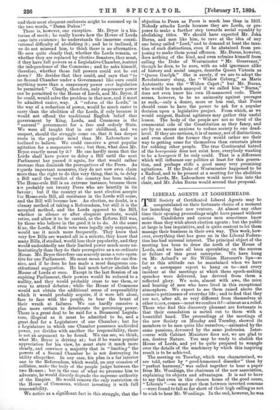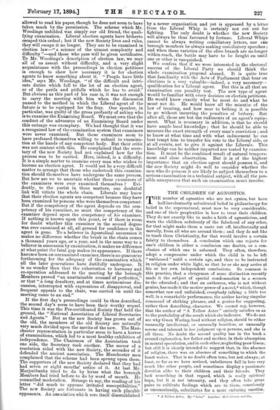LIBERAL AGENTS AT LOGGERHEADS.
THE Society of Certificated Liberal Agents may be congratulated on their fortunate choice of a moment for launching their new venture. At almost any other time their opening proceedings might have passed without notice. Candidates and caucus men sometimes know more than they wish about election agents ; but the public at large is less inquisitive, and is quite content to let them manage their business in their own way. This week, how- ever, everything that has gone on in the Liberal Federa- tion has had unusual interest. The principal object of the meeting has been to draw the teeth of the House of Lords, and we have all been speculating on the success or failure of this great enterprise. We have hung on Mr. Acland's or Sir William Harcourt's lips—so far as this attitude can be maintained when we have only a newspaper report to hang on to—and every incident at the meetings at which these epoch-making speeches were delivered, has derived from them a reflected glory. We note, almost with awe, the mien and bearing of men who have lived in this exceptional atmosphere. We expect to see them raised above the common pettinesses of everyday life ; and to find that they are not, after all, so very different from themselves at other times, comes—must we confess it ?—almost as a relief. Those who find this discovery pleasant are fortunate in that their consolation is meted out to them with a bountiful hand. The proceedings at the meetings of the new Society on Monday and Tuesday, showed its members to be men quite like ourselves,—animated by the same passions, devoured by the same jealousies. Inter- course with Cabinet Ministers does not, we are glad to see, destroy Nature. You may be ready to abolish the House of Lords, and yet be quite prepared to wrangle over the details of the machinery by which this inspiring result is to be achieved.
The meeting on Tuesday, which was characterised, we are told, rather by "good-humoured disorder" than by "perfect harmony," was called together to hear a paper from Mr. Woodings, the chairman of the new association, explaining its objects and advantages. It is sad to have to say that even in this chosen home of the good cause, "Liberals "—we must put them between inverted commas —were found to fall so far short of their high calling as not to wish to hear Mr. Woodings. In the end, however, he was allowed to read his paper, though be does not seem to have taken much by the permission. The scheme which Mr. Woodings unfolded was simply our old friend, the quali- fying examination. Liberal election agents. have hitherto escaped this ordeal ; but if the new Society hves and rules, they will escape it no longer. They are to be examined in election law—" a science of the utmost complexity and difficulty "—and those who pass will be given certificates. To Mr. Woodings's description of election law, we may all of us assent without difficulty, and a very slight acquaintance with the proceedings in election petitions is enough to show how necessary it is for election agents to know something about it. "People have httle idea," says Mr. Woodings, "of the difficult and intri- cate duties which fall to the lot of an election agent, or of the perils and pitfalls which he has to avoid." But obvious as this part of his case is, it was not enough to carry the meeting with him when the discussion passed to the method in which the Liberal agent of the future is to be equipped for the fray. One speaker, in particular, was guilty of the gross profanity of asking who is to examine the Examining Board. We must own that the conduct of the advocates of an Examining Board under this outrage was exemplary. We had thought that it was a recognised law of the examination system that examiners were never examined. But these examiners seem to have professed themselves willing to submit to examina- tion at the hands of any competent body. But their critic was not content with this. He complained that the secre- tary of the new Society had not explained how far the process was to be carried. Here, indeed, is a difficulty. It is a simple matter to examine every man who wishes to become an election agent. It would not be a very difficult matter to arrange that those who undertook this examina- tion should themselves have undergone the same process. But how are we to ascertain whether these examiners of the examiners were ever examined themselves P Evi- dently, to the purist in these matters, one doubtful link will vitiate the whole chain. Liberals may know that their election agents are competent because they have been examined by persons who were themselves competent. But if the competency of the agent depends on the com- petency of his examiner, so must the competency of the examiner depend upon the competency of his examiner. If nothing is known upon this point, or if there is room for doubt whether this examiner in the second degree was ever examined at all, all ground for confidence in the agent is gone. To a believer in Apostolical succession it makes no difference whether the break in the chain comes a thousand years ago, or a year, and in the same way to a believer in succession by examination, it makes no difference at what point the fatal gap makes its appearance. If there has once been an unexamined examiner, there is no guarantee forthcoming for the adequacy of the examination which all the later generations have dutifully undergone. It is no wonder then that the exhortation to harmony and co-operation addressed to the meeting by the borough Members proved "an unattainable counsel of perfection," or that "a long desultory, and at times acrimonious dis- cussion, interrupted with expressions of disapproval, and frequent appeals to the chair, was carried on until the meeting came to an end."
If the first day's proceedings could be thus described, the second day's seem to have been their worthy sequel. This time it was the Pre-certificated Society that held the ground, the "National Association of Liberal Secretaries and Agents." But as the new Society has grown out of the old, the members of the old Society are naturally 'very much divided upon the merits of the new. The Man- chester representation in particular seem to have a horror of examinations, which led to a most healthy exhibition of independence. The Chairman of the Association took one side, the Secretary took another. The mover of a resolution sided with the new Society, the seconder of it defended the ancient association. The Manchester men complained that the scheme had been sprung upon them. The supporters of the new Society declared that they had had seven or eight months' notice of it. At last Mr. Marjoribanks tried to do by letter what the borough Members had tried before to do by word of mouth. He counselled moderation. Strange to say, the reading of his letter "did much to appease irritated susceptibilities." The new Society are fortunate in having such placable opponents. An association which sees itself disestablished by a newer organisation and yet is appeased by a letter from the Liberal Whip is certainly not cut out for fighting. The only doubt is whether the new Society will always be thus favoured by fortune. Liberal Whips cannot be always writing conciliatory letters, nor can borough members be always making conciliatory speeches ; and when these varieties of the olive branch are no longer within reach, the battle may have to be fought on until one or other is vanquished. We confess that if we were interested in the electoral success of the Liberal Party we should think the whole examination proposal absurd. It is quite true that familiarity with the Acts of Parliament that bear on elections is a very valuable—indeed, a very necessary— qualification for a Liberal agent. But this is all that an examination can possibly test. The new type of agent would be familiar with every decision on election petitions. He would know exactly what he must do and what he must not do. He would know all the minutia) of the law of treating, and how near to bribing it is possible to go without incurring the penalties of bribery. But after all, these are but the rudiments of an agent's equip- ment. What is necessary in addition, is that he should have ample local knowledge ; that he should be able to measure the exact strength of every man's conviction ; and to know at what time and with what inducement he can best tempt him to transfer his vote to the Liberal side, or at all events, not to give it against the Liberals. This knowledge can be neither imparted nor tested by examina- tion. It must be the combined result of natural tempera- ment and close observation. But it is of the highest importance that an election agent should possess it, and the new Society might do well to consider whether the men who do possess it are likely to subject themselves to a serious examination in a technical subject, with all the pos- sible annoyances that such an examination must involve.







































 Previous page
Previous page